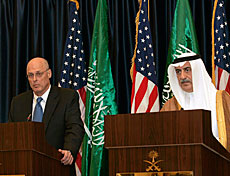JEDDAH, 1 June 2008 — Finance Minister Dr. Ibrahim Al-Assaf said yesterday that Saudi Arabia has no plans to drop the riyal’s peg to the US dollar, adding the linkage was serving the Kingdom’s interests well.
“We have no intention of dropping the peg or doing a revaluation,” the Saudi minister said during a joint press conference with US Treasury Secretary Henry Paulson, who is on a three-nation Gulf tour.
Paulson said the dollar-peg was a sovereign decision by Saudi Arabia and other Gulf countries. “The (future of the) link between these currencies and the dollar rests in the hands of these governments,” the Saudi Press Agency quoted Paulson as saying.
Al-Assaf added that the dollar-peg had served the Gulf countries well. “The dollar-peg, I think, has served this country (Saudi Arabia) and this region well. That speaks for itself,” he said.
Al-Assaf and Paulson’s statements come amid calls by GCC officials, economists and businessmen to drop the dollar-peg to curb rising inflation and commodity prices. “We have repeatedly stated that we don’t have any intention to de-link the riyal from the US dollar and we take the Kingdom’s interests into consideration when taking a decision on the exchange rate,” Al-Assaf told reporters.
Before leaving the Kingdom, Paulson met Custodian of the Two Holy Mosques King Abdullah. He is to visit Qatar and the UAE.
Dollar-pegs in five of the six Gulf Cooperation Council countries direct their respective central banks to match US interest rate cuts. The peg also reduces purchasing power for goods denominated in other currencies. In May last year, Kuwait decided to de-peg from the dollar, instead pegging it to a basket of currencies. The dinar has since appreciated by some 7.7 percent against the greenback.
But Saudi Arabia, Bahrain, Oman, Qatar and the UAE have so far turned down calls for an adjustment to their exchange rate, saying it would harm their economies.
The policy of pegging currencies to the dollar enhanced monetary stability and benefited domestic economies when the US and Gulf economies were heading in the same direction.
Gulf economies are now growing at a rapid pace, spurred by an unprecedented oil windfall. In contrast, the US economy is on the verge of recession as a result of the weak dollar, high-energy prices and a liquidity crunch.
Speaking about rising prices of oil, Paulson called for additional investment in oil-producing countries, particularly from foreign sources, to help increase production. “There is no doubt that the current prices are a burden on economies and people around the world.”
Al-Assaf concurred, saying Saudi Arabia was investing billions of dollars to increase both upstream crude oil production and downstream refining capacity to help meet global demand. “We don’t like these extreme volatilities in the market. They are not good for both consuming and producing countries.” Al-Assaf said his talks with Paulson also covered the international economic situation, financial sector and developments in the US real estate market.
Paulson said the main purpose of his visit to the Kingdom was to discuss investments.


